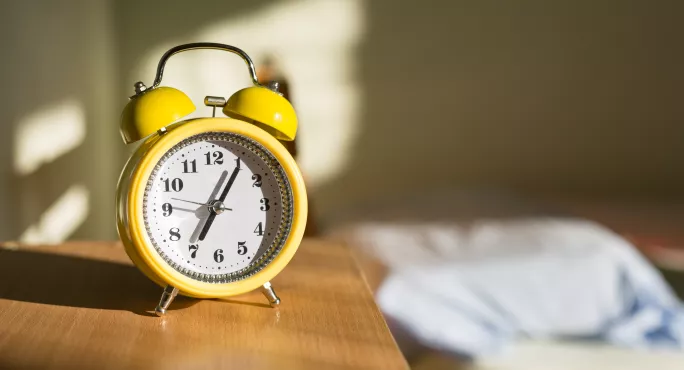- Home
- Leadership
- HR
- Want to boost your wellbeing in 2021? Go to bed earlier
Want to boost your wellbeing in 2021? Go to bed earlier

We didn’t talk very much about “staff wellbeing” 10 years ago. But the growing recruitment crisis, poor levels of staff retention and additional Covid-19 pressures have made it a hot topic in schools.
Indeed, its importance was borne out by the recent Tes Staff Wellbeing Report (October 2020), which revealed that only 44 per cent of respondents agreed with the statement that their work-life balance was sustainable, while 19 per cent actively disagreed.
Some 21 per cent of respondents felt that their stress levels weren’t sustainable, with one in five teachers (20 per cent) reporting their workload wasn’t practical or achievable.
This data begs the question of where the balance of responsibility for wellbeing lies, as well as how schools and teachers should respond.
The school’s responsibility
Schools, of course, have a responsibility to create a culture that is open, inclusive and supportive, where staff feel safe (no bullying, etc), where colleagues look out for each other and managers check in regularly with their teams.
This must, in turn, be a culture where “it’s OK not to be OK”, with no stigma or judgement made when colleagues ask for help.
And schools also have a responsibility to manage the key resources of support and time.
Effective administrative and teaching-assistant support can make an enormous difference to teachers and middle leaders struggling at the chalkface. When this is not in place, the increased workload inevitably brings stresses and strains.
Alongside this, school leaders need to recognise that they routinely make decisions that can increase teacher workload.
The scheduling of reporting cycles, parent-teacher meetings, coursework deadlines and annual review meetings all have the potential to tip busy staff over the edge. So the impact on staff must be taken into consideration when constructing the school calendar.
The teacher’s responsibility
But the school is only one side of the wellbeing equation.
To adapt what JKF famously said: “Ask not what your school can do for you, ask what you can do for yourself.”
In essence, teachers should take ownership of their own physical and mental health. After all, school is only one part of teachers’ lives and often not the only cause of stress, anxiety and depression.
In particular, it is teachers’ responsibility to ensure they get enough sleep, find enough time to exercise, and seek out and invest time in counselling/coaching support when they need it.
Modelling work-life balance
Of course, a good school should, as outlined, provide the support - and time - for this to be possible.
This is where leaders need to model this ideal - after all, the principal and senior management team set the tone for the organisation.
If they are sending emails and WhatsApp messages at 10.30pm, that sets the level of expectation and establishes the norm for the school community.
I’m a great believer that schools should consider introducing an email curfew between 7pm and 7am, and at weekends; this delineates the working day and creates clear personal time.
Anyone wishing to compose emails should use the delayed-delivery feature so that they can clear their to-do list without putting pressure on colleagues out of hours.
At Berkhamsted School, where I was once principal, introducing an email curfew not only enhanced staff wellbeing during term time, but it also reduced overall email traffic by 25 per cent.
So, as school principal, I try to model work-life-balance behaviour by putting on my “out of office” at weekends and during the holidays, thereby hopefully, tacitly, giving colleagues permission to have some downtime as well.
The same applies to working late. When I don’t have meetings after school, I try to leave work on time, even if it means spending a couple of hours working at home.
Doing this gives permission for others to leave at the end of the school day and manage other commitments - and sends the message that working late is not a virtue.
Go to bed
And this brings me to sleep.
I have come to realise that I need a good night’s sleep - not only for my personal wellbeing, but also for the good of the school. When I am tired, I am grumpy, more impatient, less tolerant and I make poor decisions.
All this can have a disproportionate impact on the organisation.
For this reason, even though evening commitments go with the territory as a school principal, I have hit upon the pattern of trying to get an early night three days a week during term.
Prioritising sleep over late nights out at the weekend, or watching sport or box sets during the week, may sound dull, but, from both a personal and corporate-wellbeing perspective, it is time well spent.
Mark S Steed is principal and CEO of Kellett School, the British International School in Hong Kong, and previously ran schools in Devon, Hertfordshire and Dubai. He tweets @independenthead
Register with Tes and you can read two free articles every month plus you'll have access to our range of award-winning newsletters.
Keep reading with our special offer!
You’ve reached your limit of free articles this month.
- Unlimited access to all Tes magazine content
- Save your favourite articles and gift them to your colleagues
- Exclusive subscriber-only stories
- Over 200,000 archived articles
- Unlimited access to all Tes magazine content
- Save your favourite articles and gift them to your colleagues
- Exclusive subscriber-only stories
- Over 200,000 archived articles



